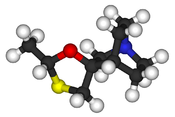| Revision as of 21:15, 22 October 2023 editGabbyTheDarkAlien (talk | contribs)Extended confirmed users752 editsm removed unnecessary commaTag: Visual edit← Previous edit | Latest revision as of 06:39, 25 October 2024 edit undo76.174.0.57 (talk) Cats. | ||
| Line 83: | Line 83: | ||
| {{Muscarinic acetylcholine receptor modulators}} | {{Muscarinic acetylcholine receptor modulators}} | ||
| ] | ] | ||
| ] | |||
| ] | |||
| ] | ] | ||
| ] | ] | ||
| ] | ] | ||
| ] | |||
Latest revision as of 06:39, 25 October 2024
Pharmaceutical drug Pharmaceutical compound | |
 | |
| Clinical data | |
|---|---|
| Trade names | Evoxac |
| AHFS/Drugs.com | Monograph |
| MedlinePlus | a608025 |
| Pregnancy category |
|
| Routes of administration | By mouth (capsules) |
| ATC code | |
| Legal status | |
| Legal status |
|
| Pharmacokinetic data | |
| Protein binding | <20% |
| Identifiers | |
IUPAC name
| |
| CAS Number | |
| PubChem CID | |
| DrugBank | |
| ChemSpider | |
| UNII | |
| KEGG | |
| ChEBI | |
| ChEMBL | |
| CompTox Dashboard (EPA) | |
| Chemical and physical data | |
| Formula | C10H17NOS |
| Molar mass | 199.31 g·mol |
| 3D model (JSmol) | |
SMILES
| |
InChI
| |
| (what is this?) (verify) | |
Cevimeline (trade name Evoxac) is a synthetic analog of the natural alkaloid muscarine with a particular agonistic effect on M1 and M3 receptors. It is used in the treatment of dry mouth and Sjögren's syndrome.
Medical uses
Cevimeline is used in the treatment of xerostomia (dry mouth) and Sjögren's syndrome. It increases the production of saliva.
Side effects
Known side effects include nausea, vomiting, diarrhea, excessive sweating, rash, headache, runny nose, cough, drowsiness, hot flashes, blurred vision, and difficulty sleeping.
Contraindications include asthma and angle closure glaucoma.
Mechanism of action
Cevimeline is a cholinergic agonist. It has a particular effect on M1 and M3 receptors. By activating the M3 receptors of the parasympathetic nervous system, cevimeline stimulates secretion by the salivary glands, thereby alleviating dry mouth.
See also
- Pilocarpine — a similar parasympathomimetic medication for dry mouth (xerostomia)
- Bethanechol — a similar muscarinic parasympathomimetic with longer-lasting effect
References
- ^ Ono M, Takamura E, Shinozaki K, Tsumura T, Hamano T, Yagi Y, Tsubota K (July 2004). "Therapeutic effect of cevimeline on dry eye in patients with Sjögren's syndrome: a randomized, double-blind clinical study". American Journal of Ophthalmology. 138 (1): 6–17. doi:10.1016/j.ajo.2004.02.010. PMID 15234277.
- ^ Fox RI, Fox CM (2019). "Management of Sjögren's". Dubois' Lupus Erythematosus and Related Syndromes (9th ed.). Elsevier. pp. 745–758. doi:10.1016/B978-0-323-47927-1.00060-8. ISBN 978-0-323-47927-1.
- "Cevimeline". MedicineNet. Retrieved 12 October 2007.